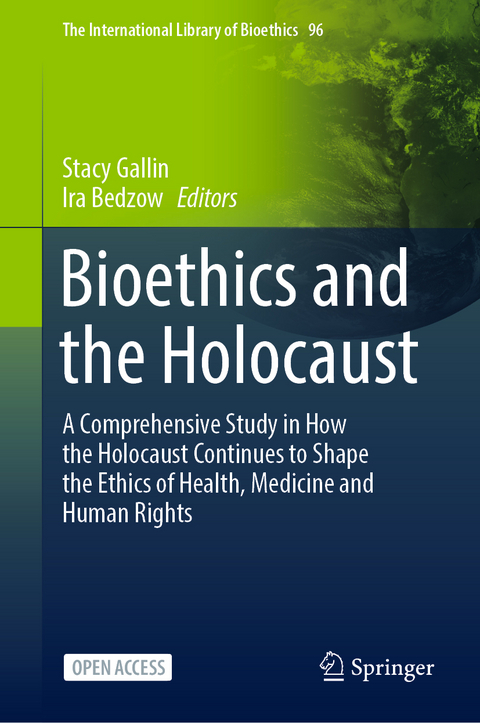
Bioethics and the Holocaust
Springer International Publishing (Verlag)
978-3-031-01986-9 (ISBN)
Stacy Gallin is the Founding Director of the Maimonides Institute for Medicine, Ethics and the Holocaust (MIMEH), a member of the Governing Council, Co-Chair of the Department of Bioethics and the Holocaust and Faculty of the Department of Education of the International Chair of Bioethics (a World Medical Association Cooperation Centre), and a Senior Fellow at the Center for the Study of Law and Religion at Emory University. She received her doctoral degree in Medical Humanities from Drew University and has worked closely with many internationally recognized organizations to raise awareness regarding the relevance of medicine, ethics and the Holocaust for modern medical practice, healthcare policy and human rights endeavors. Dr. Gallin's academic interests also include the medicalization of psychiatry, the role of human dignity in healthcare and the development of mechanisms to engage youth in social advocacy and the promotion of equality, justice, and dignity.
Ira Bedzow is the Director of The MirYam Institute Project on International Ethics & Leadership and Head of the International Chair in Bioethics Unit (a World Medical Association Cooperation Centre) at the Center for the Study of Law and Religion, Emory University. He holds a PhD in Religion from Emory University and a Masters degree from University of Chicago. His interests relate to understanding the ethical implications of biotechnology and healthcare policy as well as how organizations can create an ethical culture through values-driven leadership. Bedzow is also Senior Scholar of the Aspen Center for Social Values, co-director of the Maimonides Institute for Medicine, Ethics and the Holocaust (MIMEH), a contributor at the MirYam Institute, and a regular contributor in Forbes for their Diversity, Equity and Inclusion section. He is also an Orthodox rabbi (yoreh yoreh, yadin yadin).
Chapter 1. The Question of Relevance (Michael Berenbaum).- Chapter 2. Teaching Medical Ethics in Nazi Germany: Debunking the Myth that the Nazi Physicians Abandoned their Ethics (Tessa Chelouche).- Chapter 3. The Role of Professions in a State: The Effects of the Nazi Experience on Health Care Professionalism (Robert Baker).- Chapter 4. The Physician's Role: Patient v Popualation (David K. Urion).- Chapter 5. The Transformation of Physicians from Healers to Killers: The Role of Psychiatry (Susan M. Miller).- Chapter 6. The Physician at War (Sheena M. Eagan).- Chapter 7. Medicalization of Social Policies: Defining Health, Defining Illness (Amanda M. Caleb).- Chapter 8. Bioethics and the Krankenmorde: Disability and Diversity (Edwina Light).- Chapter 9. Race, Eugenics, and the Holocaust (Jonathan Anomaly).- Chapter 10. Physician Assisted Suicide, Euthanasia, and Bioethics in Nazi and Contemporary Cinema (Sheldon Rubenfeld).- Chapter 11. From the Nuremberg "Doctors' Trial" to the "Nuremberg Code" (Paul Weindling).- Chapter 12. The Rights and Responsibilities of the Physician to Uphold Bioethical Values in Society (Ashley K. Fernandes).- Chapter 13. Bioethics and the Holocaust in a Multicultural Context (Filotheos-Fotios Maroudas).- Chapter 14. Medicine, the Holocaust and Human Dignity: Lessons from Human Rights (Jason Adam Wasserman).- Chapter 15. The Goals of Medicine in a Post-Holocaust Society (Stacy Gallin).
| Erscheinungsdatum | 12.07.2022 |
|---|---|
| Reihe/Serie | The International Library of Bioethics |
| Zusatzinfo | XII, 323 p. 7 illus., 4 illus. in color. |
| Verlagsort | Cham |
| Sprache | englisch |
| Maße | 155 x 235 mm |
| Gewicht | 670 g |
| Themenwelt | Geisteswissenschaften ► Philosophie ► Allgemeines / Lexika |
| Naturwissenschaften ► Biologie | |
| Schlagworte | Bioethics • Bioethics and the Holocaust • Current Issues in Bioethics • History of Bioethics • History of German Medical Ethics • Human Rights and Human Dignity • Lessons Learned from the Holocaust • open access • The Future of Medicine |
| ISBN-10 | 3-031-01986-5 / 3031019865 |
| ISBN-13 | 978-3-031-01986-9 / 9783031019869 |
| Zustand | Neuware |
| Haben Sie eine Frage zum Produkt? |
aus dem Bereich


